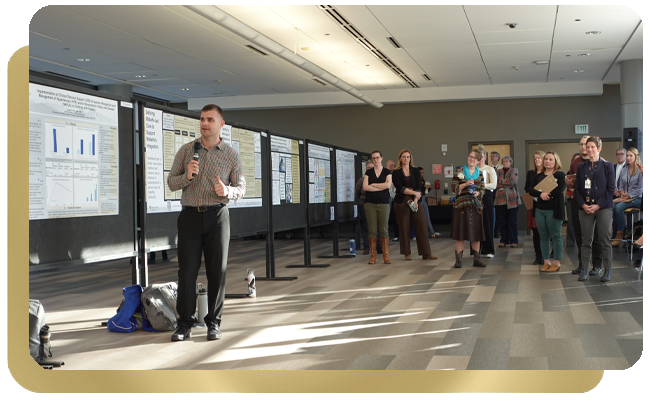Advancing nurse-led research
The Office of Research and Scholarship (ORS) focuses on transforming knowing into nursing knowledge. Our faculty, students, and staff researchers, along with the community at large, work on changing the healthcare system and nursing profession to improve patient care in Colorado and beyond. How are we doing this? Through the support services we provide, our educational events and awards, and providing spaces to learn.

What we offer

Services
We’re here to guide our students, faculty, and research staff through the research process.
- Our Research Services Professionals (RSPs) support research faculty by offering assistance to match the college’s strategic and programming goals
- Assist with grant management from start to finish to help you secure funding for your project to make the most impact
- Need help analyzing data? We have support staff on hand to look through the numbers

Educational Events
Our events highlight what our researchers are doing and how their work is improving our healthcare system and human health.
- Attend Grand Rounds, the CU Anschutz Nursing Conference of Research and Scholarship (CONRS), and student poster sessions to learn from researchers within the CU Anschutz Nursing community and in the nursing profession about how their research is put into practice
- Stay up to date with your nursing knowledge (and learn new things!) through our Continuing Education (CE) opportunities
- Keynote addresses by Dean’s Invited Scholars offer unique and thought-provoking presentations on topics that impact the nursing profession

Spaces to collaborate
We have a welcoming space for you to work, collaborate, and network while conducting research.
- The Center for Nursing Inquiry is a medium-sized conference room equipped with technology for meetings and informal gatherings
- Interview rooms allow you to talk with people involved in your research
- Visiting scholar landing zones are workspaces to call your own when you’re on campus

Honors & fellowships
Our faculty have received prestigious honors and fellowship status. Please reach out to research for more details.
What we’re working on
Research experts
Our scientists are experts in several areas. These topics incorporate several methods, including: different perspectives, community engagement, biobehavioral science, healthcare system and policy, and caring science.
- Pediatrics:
- Infant Gold Research
- Achieving a State of Healthy Weight (ASHW): This project examines the strength of obesity prevention rules in state child care licensing across the US. The ASHW team publishes an annual report in collaboration with the Centers for Disease Control and Prevention
- Women’s Health and Nurse Midwifery
- Palliative Care
- Older Adult Care
- Healthcare Informatics
- Psychiatric and Mental Health
- Veteran and Military Health
- Consortium for Veteran and Military Health: This group within the CU System promotes care and resources for veterans, service members, and their families